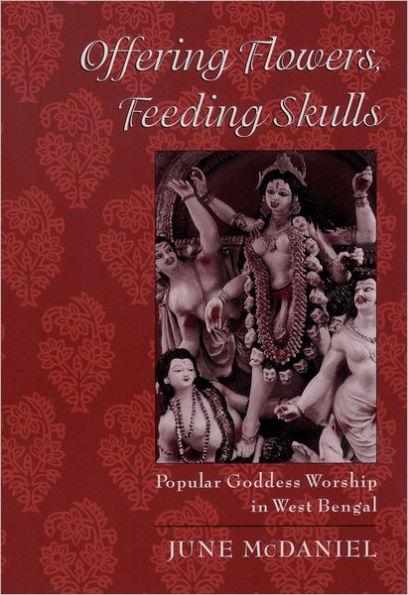There has been a great influence from Indian Tantra and Hindu traditions into the Western New Age and metaphysical communities. Some of this influence has come directly from India, through Indian practitioners, but mainly came through Western popularizers, who inevitably have marketed these traditions to suit the sensibilities of the West. For those looking to understand in more depth, I’d like to recommend the scholarship of June McDaniel.
She has studied religion in West Bengal over many years and her understanding of the worship of Kali and Durga, the two most prominent goddesses in Bengali Hinduism, both challenging and demanding, difficult deities, is very substantial. These two goddesses in their variety of forms are worshipped through ecstatic trance states and through left-hand tantra. McDaniel is a very strong proponent of the study of ecstatic states and trance and Offering Flowers, Feeding Skulls is an exceptional work.
A poly-theology, with many expressions of the divine, does not necessarily speak to all of humanity. There are many sets of spiritual truths (although in general terms they are compatible with each other). There are a variety of correct ways to express these truths in action in the world and in the lives of those devoted to or called by different deities.
Theological ambiguity is common in folk religions. June McDaniel’s work on popular goddess worship in West Bengal India documents approaches ranging from straight polytheism to agnosticism and demonstrates the emphasis on pragmatic magical religion over the abstraction of elite theologies. Her chapters 1 ‘Folk Shaktism; Life with the Goddess’, 27-66, and 2 “Tantric and Yogic Shaktism; Knowledge of the Goddess’s Ways”, 67-144, are particularly interesting.
There were direct influences into Western sex magic from the Tantra and Shakti traditions of India, as far back as the Victorian era German Ordo Templi Orientis, whose later development under Aleister Crowley was an important source for Wicca and the Ceremonial Magickians of the present. This influence continues through the popular New Age Tantra schools, which include the sex but leave out the subversive features of the mystical paths including women mystics and antinomian magical techniques (sex magic, blood work, the consumption of drugs and alcohol). ‘Proper’ ritualization of the mystical in majority religions preserves the social order, a conservative task, and by imbedding mystical insights through ritualization, the ritual becomes a system of meaning rather than a set of techniques for consciousness alteration.
McDaniel’s earlier book The Madness of the Saints; Ecstatic Religion in Bengal (University of Chicago Press, 1989) focused principally on the mystics, priestesses and priests in this tradition and is equally excellent. Her writing demonstrates a great deal of insight into these states and these forms of worship. She also addresses the distorted versions of Kali and Tantra which have come to dominate the New Age fringes here in the West, contrasting the understanding that those who have known these goddesses for thousands of years have with the shallow consumerist understanding here.
Her recent book Lost Ecstasy; Its Decline and Transformation in Religion (Palgrave MacMillan, 2018) is basically a polemic against the distorted misunderstanding of ecstatic states and the ways that the academic study of religion shies away from dealing seriously with these states. Really, speaking as though the people of the world weren’t going out there, tripping balls and talking directly with the gods for thousands of years, as if it were all about the scriptures and meditating in quiet cloistered surroundings – give me a break! Lost Ecstasy is a great book, but it is expensive, and I would not recommend it to anyone to read who’s not passionately interested in ecstatic states.
~ review by Samuel Wagar
Author: June McDaniel
Oxford University Press, 2004
356 pg. Paperback £28 / $50 Can / $36 US

